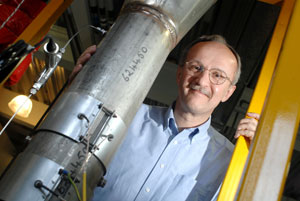Warwick Welcome - Professor Jonathan Seville
 Professor Jonathan Seville, one of the UK’s leading research engineers, has recently been appointed as the Dean of the School of Engineering.
Professor Jonathan Seville, one of the UK’s leading research engineers, has recently been appointed as the Dean of the School of Engineering.
The Midlands has been key to Professor Seville’s career for many years. He began his engineering career in Coventry almost 30 years ago in 1979 when he joined Courtaulds Ltd’s research division in Coventry as a Chemical Engineer working on design and development for cellulose-based chemicals.
He joins Warwick from the University of Birmingham where he was Head for 10 years of the Department of Chemical Engineering, which became one of the country’s top 3 departments under his leadership. He has also been Deputy Head of Birmingham’s School of Engineering for the last 5 years.
He holds degrees in Chemical Engineering from the Universities of Cambridge and Surrey and has held visiting appointments at the University of British Columbia and the Technical University of Denmark. He is a Chartered Engineer, a Fellow of the Institution of Chemical Engineers and a Fellow of the Royal Academy of Engineering.
His leadership and technical knowledge was key to winning the joint bid by the University of Birmingham and University of Warwick for the recent AWM sponsored Hydrogen Energy project for Birmingham Science City (NB Birmingham Science City includes Coventry and Warwickshire).
He has pioneered the application of chemical engineering to the design and manufacture of products for the pharmaceutical, home care and mass consumer industries, founding the Centre for Formulation Engineering at Birmingham in 1999, the first such centre in the UK. Industrial supporters have included Unilever, Procter & Gamble, GSK, Pfizer, Merck Sharp & Dohme, BP and Johnson Matthey. His research interests include the use of positron emission to visualise motion in manufacturing processes.
"New developments always come at the interfaces between disciplines. As an engineer, I’ve always enjoyed very productive relationships with scientists of all kinds. Warwick is terrifically good at building multidisciplinary groups. It’s also outstanding at working with industry and understanding the societal need. That’s what I find exciting and it’s the only way to address the "grand challenges" of our time, such as how we provide energy and continue to manufacture goods, while at the same time minimising environmental damage, and how we deliver healthcare in a new more-scientific way. Engineering is at the heart of all these things!"
